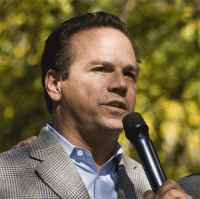The Bottom Line: Rebranding a City
‘Providence is fast becoming a hot-bed for young social
entrepreneurs, those creative individuals who take an innovative, untested idea for positive social change and develop it using entrepreneurial principles’
How one city is using social enterprise to turn around its fortunes and rebrand itself, by David N Cicilline, Mayor of Providence, Rhode Island in the U.S.
One of the key challenges facing any city globally, especially in hard economic times, is brain-drain… or failing to retain talented young people in one’s community.
For small cities in the US (and overseas) trying to expand their economies, such as Providence, Rhode Island the question of how to engage and retain our brightest students and most talented individuals is particularly pressing.
But Providence, Rhode Island’s historic and quirky state capital, is embracing its creative past (as the home to the Industrial Revolution in the US) with eye towards a future economy steeped in the creative/knowledge economy, and recognising social enterprise as a key ingredient to our future success.
Building on one of its finest assets – its large number of artists, designers, student and faculty innovators at such schools like Brown University and the Rhode Island School of Design – the city recently re-branded itself as Providence: The Creative Capital.
Like any other city, Providence welcomes and seeks to attract large corporations to provide jobs, grow the economy and broaden its tax base, yet civic leaders here recognise that it is Providence’s creative small business community (along with a large creative non-profit sector) that gives the city its unique identity and that offers the most attractive opportunities to our best and brightest minds.
Furthermore, Providence is fast becoming a hot-bed for young social entrepreneurs, those creative individuals who take an innovative, untested idea for positive social change and develop it using entrepreneurial principles.
Creative small businesses and social enterprises are flourishing here due to Providence’s ideal nexus of geographic and socio-economic elements: its location between New York and Boston, proximity to the ocean, beauty and authenticity, innovative culture, small scale that facilitates easy networking, a creative community that fosters support and connectivity, relatively low rents and costs, availability of historic, funky buildings, and the institutional support and resources of city government and higher education, particularly the world-renowned design school, the Rhode Island School of Design (RISD), and the Ivy League Brown University.
Brown and RISD recently established pioneering programmes to train, mentor and support budding social entrepreneurs, in partnership with community organisations and institutions in Providence. Brown University’s two-year-old Social Innovation Initiative and RISD’s year-old Design for Social Entrepreneurship advanced studio in industrial design. Dozens of social entrepreneurs have come through these social enterprise ‘farm systems’ with the prospect of hundreds more to come in the near future. Brown and RISD
are national leaders in the cultivation of social entrepreneurship, with Providence as their breeding ground for, and beneficiary of, talent and economic growth.
Some examples of Providence’s social entrepreneurs include:
Runa: a blended business and non-profit foundation started by Brown graduates, based in Providence and Ecuador, that generates income to conserve endangered Amazonian ecosystems and provides sustainable employment for the local populations through sales of an original health-energy drink made from a native rain forest plant.
Capital Good Fund: a social enterprise based in Providence, Rhode Island with the mission
of creating a poverty-free, inclusive green economy through innovative microfinance. To achieve this, it makes loans to high-impact low and moderate-income entrepreneurs that want to start or expand businesses, to legal permanent residents that want to apply for U.S. citizenship and to individuals that want to build their credit score and reduce their energy consumption through its ‘green credit builder’ loan product. It works with business borrowers to incorporate green products and services, to identify ways of reducing energy costs and implementing best practices such as recycling and proper use of windows, shades and thermostats.
EpiVax: founded in 1998 and led by renowned immunologist Dr Annie DeGroot with the goal of developing a world AIDS vaccine, this Providence-based for-profit company also sustains the GAIA Vaccine Foundation, a NGO that operates an HIV/AIDS clinic in Mali, Africa. Locally, EpiVax is also establishing a free healthcare clinic in Providence’s poorest
neighborhood, as well as developing vaccines to fight against TB, Smallpox, Influenza, HPV, and other diseases.
As our city’s economic agenda moves forward, my administration will be paying particular attention to the need of social enterprises, and how municipal government can play a role in helping them achieve their goals.
These ventures play a far greater role in our city’s economic ecosystem beyond their revenue earnings or employment figures. Traditionally smaller enterprises, they are playing a key role in differentiating our city nationally and globally, attracting a different kind of entrepreneur here, providing inspiration to our larger private institutions to innovate, and strengthening the fabric of our community by creating societal change. They also present unique opportunities for communities, like Providence, to be linked with other innovative communities throughout the world.
Thank you social entrepreneurs! Your impact is not lost on me, and the role you have played in strengthening the fabric of our community here, and elsewhere, thus allowing us to truly realise our brand of being The Creative Capital.

